Dolce far niente
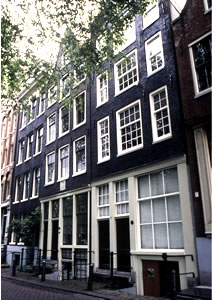
Brouwersgracht 99, Amsterdam
Hier had Theo Thijssens moeder vanaf 1890 een kruidenierszaak
Uit: In de ochtend van het leven
“Met die Arie Tol, die ook op de Brouwersgracht bleek te wonen, tegenover de Langestraat, ging ik om vier uur naar huis; we hadden haast, want om vijf uur moesten we weer op avondschool zijn, tekenen. `Ik ben al aan de blokken begonnen,’ vertelde hij.
`Ik allang,’ zei ik, maar ik vertelde niet van m’n vrijmoedige sprong.
Hij was ook op Franse cursus, op de Lauriergracht.
Ik ook, in de Raamstraat, en er was besloten dat ik daar maar blijven zou.
Ik vertelde van de bibliotheek op Letter A, over de vierhonderd boeken. O, maar op Letter G was de bibliotheek ook aardig uitgebreid, er waren nu over de zestig boeken. Ook van Jules Verne? vroeg ik. Ja, verscheidene; en ook van Kapitein Marryat. Bijvoorbeeld `Koningskind’ en `Jakob Eerlijk’. `Is `De woudlooper’ er ook bij?’ vroeg ik. Nee, `De woudlooper’ was er niet bij. Jammer, vond ik, dat was zowat het mooiste boek dat er bestond. `Nou, je moet van de week `Het koningskind’ zien te krijgen,’ zei Tol, `of `Vlissingen in 1572′, die zijn ook niet voor de poes, hoor.’
We waren aan onze winkel gekomen. `O,’ zei hij, `woon je hier? Nou, ik kom je morgenochtend afhalen, hoor.’
Dat is het begin geweest van m’n grote jongensvriendschap.”
(…)
“ Mater, de grossier die op de Rozengracht z’n zaak had en die elke woensdag om één uur de bestelling kwam opnemen, kon álles leveren, behalve petroleum; petroleum, beweerde hij, is de dood in een kruidenierszaak. Maar hij mócht lang niet alles leveren. De suiker nam moeder van hem, omdat hij de suiker van Spakler had; en rijst en ’t losse meel en andere grutterswaren, en zeep en soda leverde Mater ook. Maar azijnin mijn winkel alleen azijn van De Ooievaar, zei moeder; en ’t was geen praatje: ik moest altijd naar die fabriek, op de Lijnbaansgracht, om een vaatje te bestellen.”
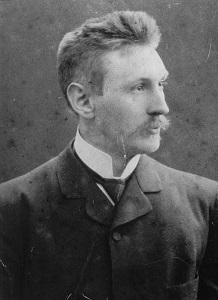
Theo Thijssen (16 juni 1879 – 23 december 1943)
In 1901
De Argentijnse schrijver en wiskundige Guillermo Martínez werd geboren in Bahía Blanca op 29 juli 1962. Zie ook alle tags voor Guillermo Martinez op dit blog.
Uit:The Oxford Murders (Vertaald door Sonia Soto)
“And yet, exactly on time, the plane cut calmly through the layer of cloud, and the green hills of England appeared, undeniably true to life, in a light that had suddenly faded, or perhaps I should say deteriorated, because that was my impression: that, as the plane went down, the light was becoming increasingly tenuous, as if it were weakening and languishing, having passed through a filter.
My supervisor had instructed me to take the bus from Heathrow straight to Oxford and apologised several times for not being able to meet me when I arrived as she’d be in London all week at an algebra conference. Far from bothering me, this seemed ideal. I’d have a few days to wander around town and get my bearings, before my academic duties began. I didn’t have much luggage, so when the bus arrived at the station I carried my bags across the square to get a taxi. It was the beginning of April but I was glad I’d kept my coat on: there was an icy, cutting wind, and the pallid sun wasn’t much help. Even so, I noticed that almost everyone at the fair occupying the square, as well as the Pakistani driver who opened his taxi door for me, was in short sleeves. I gave him Mrs Eagleton’s address and as we drove off I asked if he wasn’t cold. “Oh no, it’s spring,” he said, waving towards the feeble sun as if this were irrefutable proof.
The black cab advanced sedately towards the main street. As it turned left, I saw, on either side, through half-open wooden gates and iron railings, neat college gardens with immaculate, bright-green lawns. We passed a small graveyard beside a church, with tombstones covered in moss. The taxi went a little way along Banbury Road before turning into Cunliffe Close, the address I had written down. The road now wound through an imposing park. Large, serenely elegant stone houses appeared behind privet hedges, reminding me of Victorian novels with afternoon tea, games of croquet and strolls through the gardens.”
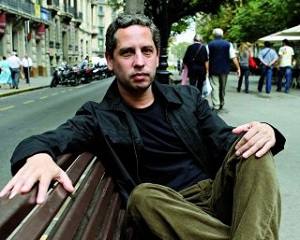
Guillermo Martínez (Bahía Blanca, 29 juli 1962)
De Nederlandse schrijver Harry Mulisch werd geboren op 29 juli 1927 in Haarlem. Zie ook alle tags voor Harry Mulisch op dit blog.
Uit: Archibald Strohalm en het paradijs
“Dan kan hij drie dingen doen: mij zijn huis uitgooien, en dan heb ik niks; al zijn geld weggeven aan krepeerders, en dan heb ik ook niks; helemaal niks doen, en dan wil ik niks van hem hebben. Ik pies dus altijd naast de pot!’ Hij barstte weer in lachen uit. ‘Dus blijf ik maar dekors en muren schilderen, en plafonds witten, en steun trekken bij de federatie.’
‘Verontschuldig je niet,’ zei archibald strohalm. ‘Ik zou nergens heen wìllen. Het is hier toch heerlijk.’ Daar stond hij: als het slangenkapsel van Medoesa, maar zonder haar gezicht.
‘Zo schuw?’ lachte Bronislaw. ‘Vertel op, wat loop je hier te zwerven?’
Nu ging hij het weer zeggen:
‘Ik filosofeerde.’
‘Zo mag ik het horen! Zijn of niet-zijn, dat is de kwestie. Maar ik denk, dus ik ben! Geef liever eens een sigaret weg.’
Flauwtjes glimlachend haalde archibald strohalm een pakje tevoorschijn en presenteerde. Hilde bedankte; zelf stak hij ook niet op.
‘Weet je…’ begon Boris Bronislaw, en wachtte even om zijn sigaret aan te steken, – ‘een filosoof, die verwonderd onderzoekt hoe het komt dat de kosmos zo luisterrijk in elkaar zit, doet me altijd denken aan een lamp, die zich verbaasd afvraagt hoe het komt, dat de kamer zo mooi is verlicht. Of aan een armetierig thee-lichtje, dat vloekt omdat de boel zo schemerig is en vol rottige schaduwen, waaruit ieder ogenblik de spoken springen… Hilde!’ riep hij ontzet, terwijl hij zich plotseling met een ruk naar haar toe boog en zijn arm voor haar buik sloeg.”
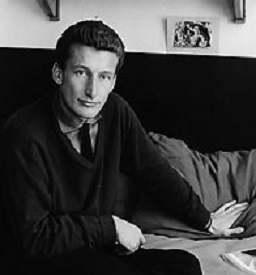
Harry Mulisch (29 juli 1927 – 30 oktober 2010)
De Koreaans-Amerikaanse schrijver Chang-Rae Lee werd geboren op 29 juli 1965 in Seoel. Zie ook alle tags voor Chang-Rae Lee op dit blog.
Uit: The Surrendered
“Korea, 1950
The journey was nearly over.
The night was unusually chilly, the wind sharpened by the speed of the train as it rolled southward through the darkened valley. The cotton blanket June had stolen was large enough to spread as a tarp and at the same time wrap around her younger brother and sister and herself, but it was threadbare and for brief stretches the train would accelerate and the wind would cut right through to them. It had not been a problem the night before but now they were riding on top of the boxcar, as there was no more room within any of them, even as the train was more than a dozen cars long. A massive phalanx of refugees had met the train at the last station, and in the time it took her siblings to relieve themselves by the side of the tracks they had lost their place and had had to climb the rusted ladder between the cars, June running alongside for fifty meters until her brother was high enough on the rungs so she herself could jump up and on.
There was a score or so of people atop every car, groupings of families and neighbors, mostly women and the old and the young, and then a cluster or two like theirs, children traveling by themselves. June was eleven; Hee-Soo and Ji-Young had just turned seven. They were fraternal twins, though looked as much alike as a sister and brother could, only the cut of their hair distinguishing them. June knew they could have waited in the hope of another train with room inside but it hadn’t been cold when they stopped just before dusk and she decided they ought to keep moving while they had the chance.”
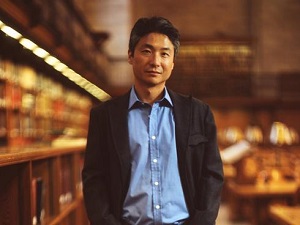
Chang-Rae Lee (Seoel, 29 juli 1965)
Zie voor nog meer schrijvers van de 29e juli ook mijn blog van 29 juli 2013 en ook mijn twee blogs van 29 juli 2011.
